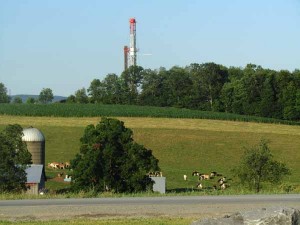DEP seeks record fine of $8.9 million from Range Resources
-
Susan Phillips
The Pennsylvania Department of Environmental Protection announced a record fine today against the Texas-based Range Resources, which the agency says has failed to fix a gas well that polluted groundwater and a stream in Lycoming County. The DEP announced Tuesday that it will assess an $8.9 million fine against Range for refusing to fix the faulty cement job on a natural gas well that the agency says caused methane to migrate into private drinking water supplies. The penalty would be the largest to date against a Marcellus Shale gas driller.
“Today, we made it clear that we take seriously our responsibility to protect residents and Pennsylvania’s natural resources,” said DEP Secretary John Quigley in a statement. “Clean water is an important part of a strong economy and Range Resources owes it to the people of Lycoming County and surrounding areas to make the repairs necessary to immediately stop the discharge of natural gas to the waters.”
The fine sought by the DEP is more than double the highest fine ever issued by the agency against a gas driller. That fine, $4.15 million and now the second highest, was also issued to Range Resources back in September. In that case the company agreed to pay the fine for violations at six wastewater impoundments in Washington County. But in this recent Lycoming County case, Range Resources has not agreed to the sanction, saying the methane migration is naturally occurring and existed before their well was drilled.
The company issued the following statement:
“We respect and share the department’s mission to safely produce natural gas while protecting the environment. We believe we’ve complied with DEP’s requests and while we have a disagreement about this situation, we are very confident in the mechanical integrity of the well and we are equally confident that the environment and community is not at risk. We will continue to be transparent with the Department with the substantial data we have that proves that the methane of concern exists naturally at the surface and subsurface in this part of the state, long before our activity, and is not in any way related to our operations.”
DEP says Range is appealing the decision to the state Environmental Hearing Board.
Range Resources originally drilled the well in the winter of 2011, and fracked it in June of that year. DEP issued a notice of violation in September 2013, citing a faulty cement job. DEP says despite the violations the company has yet to fix the well.
DEP Secretary John Quigley told StateImpact it was a case of “severe methane migration” and that at least five residential water wells were impacted and continue to require treatment.
“The agency has conducted an extensive investigation,” said Quigley. “We tested the methane from the residential wells. We observed methane bubbling in a stream. [We’ve detected it] coming out of the ground and killing vegetation in a farmer’s field.”
Quigley said the agency used isotopic testing to confirm the methane migration resulted from the Range Resources gas well, and is not naturally occurring.
On May 11, 2015 DEP gave Range 10 days to come up with a remediation plan that would prevent the further migration of methane and other fluids, calling the company’s actions “unlawful conduct and a public nuisance.”
But DEP rejected the company’s proposed plan, which it says did not include making necessary repairs. Instead, the plan would have put the non-producing well into production. DEP has since ordered Range “to remediate the well in a manner that immediately ceases the discharge of methane to ground and surface water.” The company has ten days to submit a new plan to the DEP.
Quigley says the agency may be willing to reduce the $8.9 million civil penalty depending on the company’s response. The fine would be assessed under the Clean Streams Law and the 2012 Oil and Gas Act, also known as Act 13.
Quigley says assessing fines is a complicated matrix, which includes the severity and duration of the impact. Although it’s the largest fine to date against a gas driller, Quigley said it could have been much higher.
“The message is clear, don’t pollute the waters of the commonwealth,” said Quigley. “Build better wells. Refusing to make repairs is simply not an option.”

















